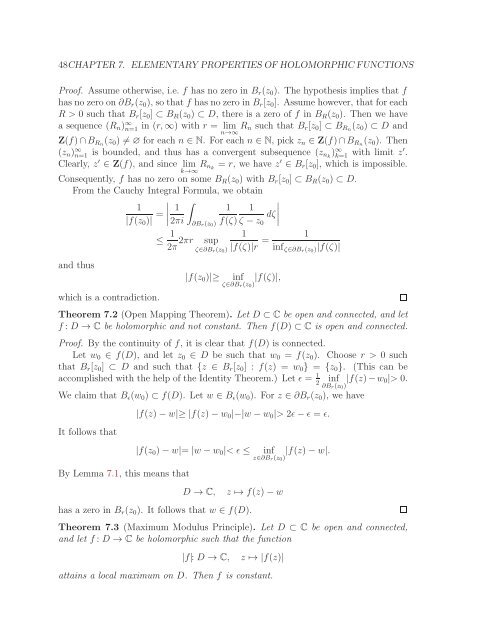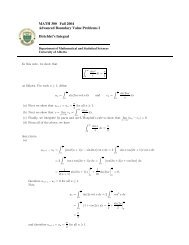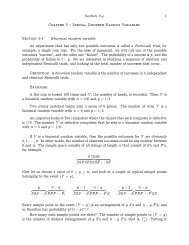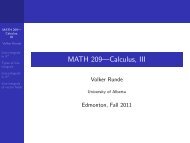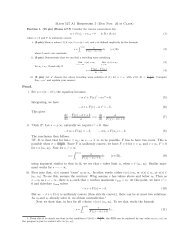Math 411: Honours Complex Variables - University of Alberta
Math 411: Honours Complex Variables - University of Alberta
Math 411: Honours Complex Variables - University of Alberta
You also want an ePaper? Increase the reach of your titles
YUMPU automatically turns print PDFs into web optimized ePapers that Google loves.
48CHAPTER7. ELEMENTARYPROPERTIESOFHOLOMORPHICFUNCTIONS<br />
Pro<strong>of</strong>. Assume otherwise, i.e. f has no zero in Br(z0). The hypothesis implies that f<br />
hasno zero on∂Br(z0), so that f has nozero inBr[z0]. Assume however, that foreach<br />
R > 0 such that Br[z0] ⊂ BR(z0) ⊂ D, there is a zero <strong>of</strong> f in BR(z0). Then we have<br />
a sequence (Rn) ∞ n=1<br />
in (r,∞) with r = lim<br />
n→∞ Rn such that Br[z0] ⊂ BRn(z0) ⊂ D and<br />
Z(f)∩BRn(z0) �= ∅ for each n ∈ N. For each n ∈ N, pick zn ∈ Z(f)∩BRn(z0). Then<br />
(zn) ∞ n=1 is bounded, and thus has a convergent subsequence (znk )∞k=1 with limit z′ .<br />
Clearly, z ′ ∈ Z(f), and since lim Rnk<br />
k→∞ = r, we have z′ ∈ Br[z0], which is impossible.<br />
Consequently, f has no zero on some BR(z0) with Br[z0] ⊂ BR(z0) ⊂ D.<br />
From the Cauchy Integral Formula, we obtain<br />
1<br />
|f(z0)| =<br />
� � �<br />
�<br />
�<br />
1 1 1 �<br />
�<br />
dζ�<br />
2πi ∂Br(z0) f(ζ) ζ � −z0<br />
≤ 1 1<br />
2πr sup<br />
2π ζ∈∂Br(z0) |f(ζ)|r =<br />
1<br />
infζ∈∂Br(z0)|f(ζ)|<br />
and thus<br />
which is a contradiction.<br />
|f(z0)|≥ inf<br />
ζ∈∂Br(z0) |f(ζ)|,<br />
Theorem 7.2 (Open Mapping Theorem). Let D ⊂ C be open and connected, and let<br />
f: D → C be holomorphic and not constant. Then f(D) ⊂ C is open and connected.<br />
Pro<strong>of</strong>. By the continuity <strong>of</strong> f, it is clear that f(D) is connected.<br />
Let w0 ∈ f(D), and let z0 ∈ D be such that w0 = f(z0). Choose r > 0 such<br />
that Br[z0] ⊂ D and such that {z ∈ Br[z0] : f(z) = w0} = {z0}. (This can be<br />
accomplished with the help <strong>of</strong> the Identity Theorem.) Let ǫ = 1 inf |f(z)−w0|> 0.<br />
2<br />
∂Br(z0)<br />
We claim that Bǫ(w0) ⊂ f(D). Let w ∈ Bǫ(w0). For z ∈ ∂Br(z0), we have<br />
It follows that<br />
By Lemma 7.1, this means that<br />
|f(z)−w|≥ |f(z)−w0|−|w−w0|> 2ǫ−ǫ = ǫ.<br />
|f(z0)−w|= |w−w0|< ǫ ≤ inf<br />
z∈∂Br(z0) |f(z)−w|.<br />
D → C, z ↦→ f(z)−w<br />
has a zero in Br(z0). It follows that w ∈ f(D).<br />
Theorem 7.3 (Maximum Modulus Principle). Let D ⊂ C be open and connected,<br />
and let f: D → C be holomorphic such that the function<br />
|f|: D → C, z ↦→ |f(z)|<br />
attains a local maximum on D. Then f is constant.


